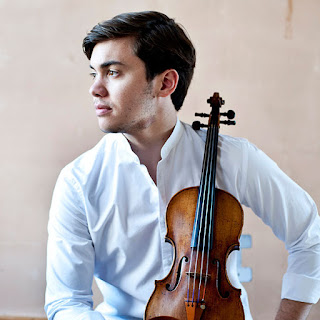ISO pays a visit to not-so-merry 'Merrie England'
A famous English poem opens with this outburst: "Hail to thee, blithe spirit!" A bird is being addressed, though the poet, Percy Bysshe Shelley, has given himself license to say it isn't. The second line of "To a Skylark" is explicit about that. And there isn't much blithe spirit, feathered or otherwise, to hail in the English music the Indianapolis Symphony Orchestra is featuring this weekend. That's another contradiction, this time to an old stereotype, the pastoral vision of "Merrie England."
As guest conductor Carlos Kalmar pointed out from the podium Friday, a persistent image of measured calm and lofty elegance about things English is readily subject to contradiction. English history alone is tumultuous enough to pose a challenge to such views. And so it turned out that the only blithe spirit on display in the first of two "Greetings from England" concerts was the animated Recitative and Scherzo, the Fritz Kreisler encore played by guest concert soloist Benjamin Beilman.
 |
| Benjamin Beilman's Indianapolis history goes back to 2010. |
The announced program opened with "This Midnight Hour," a dreamy but rather menacing tone poem by Anna Clyne, a 41-year-old native of London. The scheduled piece featuring Beilman, who won the bronze medal in the 2010 International Violin Competition of Indianapolis, followed: the heavy, broad-based Violin Concerto in G minor by Samuel Coleridge-Taylor.
After intermission came a work that surprised even the English by its contrast with the composer's publicly expressed musical personality, which had done much to confirm "Merrie England" self-regard. The wider problems of the early 1930s were not on Ralph Vaughan Williams' mind when he wrote his Symphony in F minor, the first of his symphonic output to which he was willing to assign a number, 4.
Opening with a frightening barrage of orchestral sound, the Fourth goes on to make any moment of relief rare and even a little self-contradictory. It's a heady mixture of dissonance and motoric energy, with abrupt changes of texture that the ISO handled well Friday night under Kalmar's excellent control. The mild ending of the first movement, with the flute prominent, suggests exhaustion as much as genuine repose.
Wind sonorities had a snarling quality in the Scherzo, which kept the work's dash of humor severely compromised by a feeling one commentator has labeled poisonous. Most exciting, though not in any uplifting sense, was the extensive fugal coda, announced by braying brass and carried through by the orchestra with the ultimate in grim determination. The performance was electrifying.
"I admire the fact that you actually showed up," Kalmar told the audience from the podium before a note had been sounded. He was referring both to the relative obscurity of the program as well as the moments of assault that were soon to be delivered. Functioning in these concerts as a bracing, darkly colored kind of overture,"This Midnight Hour" is an abstract version of a scenario depicting a woman running wildly at night. It might almost be taken as a speeded-up version of Schoenberg's "Erwartung," but without the fatal sense of purpose and discovery of that expressionist monodrama. Clyne apparently didn't want to overload such a work with dread, but instead invites us to revel in the mystery of a nocturnal adventure without a backstory or a fateful destination. The lower strings were at the forefront several times, and acquitted themselves well in Friday's performance.
As for the concerto, Beilman and the ISO brought before the audience the work of a short-lived Afro-British composer: Coleridge-Taylor died in his late 30s, his life hobbled by poor health and poverty. This work, as played Friday, gave Indianapolis music-lovers a fourth chance to hear Beilman in concert since he distinguished himself in competition here. His phrasing is well-modeled and exhibited through a tone of consistent stature and rhetorical grace.
The music requires a soloist of such distinction and evident commitment. It seemed at first hearing to be a tub sitting firmly on its own bottom. By that I mean that every gesture, theme and transitional passage was probably thoroughly justified in the developing composer's mind. The concerto sounded worth hearing once, but, despite some captivating gestures, didn't offer much incentive to hear it again.
In its defense, while Shelley praised the skylark's "unpremeditated art," Coleridge-Taylor's art seemed very much at the opposite end of the spectrum. And plenty of premeditation goes a long way toward justifying a composition's right to have public exposure. So does what such an inspired solo interpreter as Beilman can invest it with.



Comments
Post a Comment